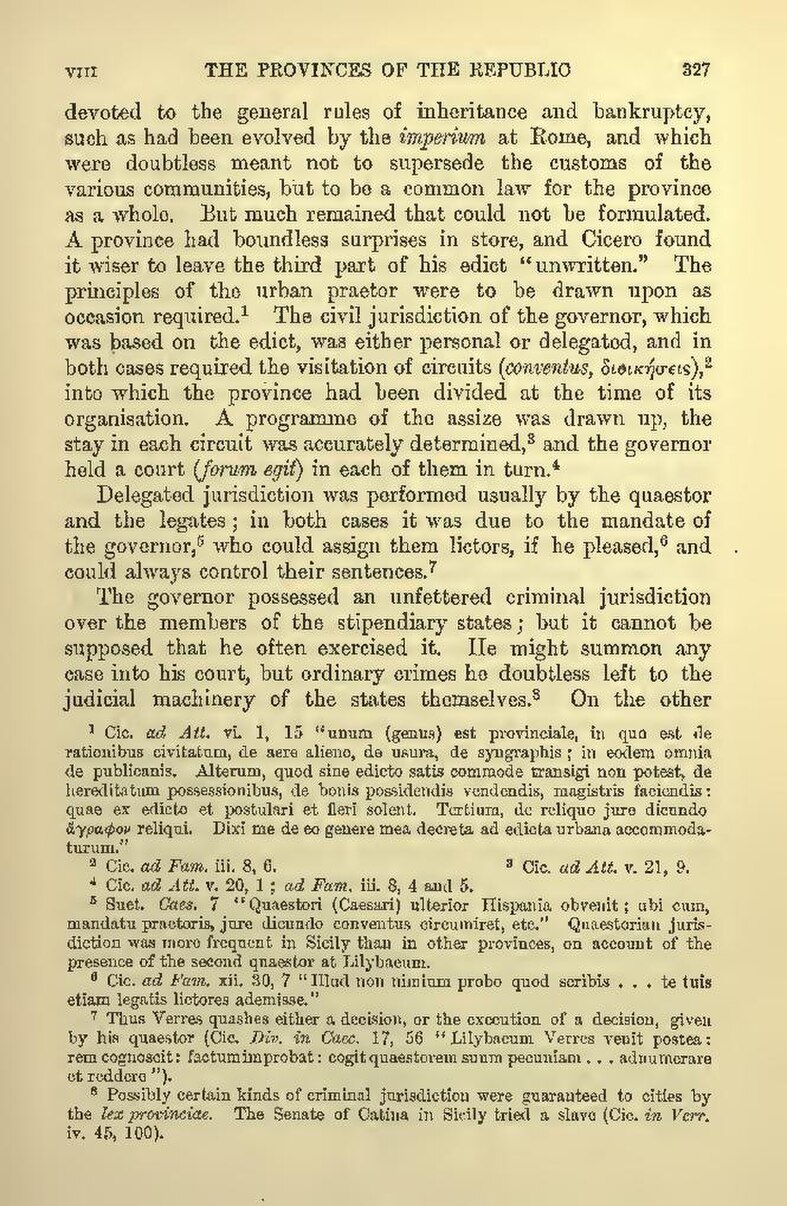devoted to the general rules of inheritance and bankruptcy, such as had been evolved by the imperium at Rome, and which were doubtless meant not to supersede the customs of the various communities, but to be a common law for the province as a whole. But much remained that could not be formulated. A province had boundless surprises in store, and Cicero found it wiser to leave the third part of his edict "unwritten." The principles of the urban praetor were to be drawn upon as occasion required.[1] The civil jurisdiction of the governor, which was based on the edict, was either personal or delegated, and in both cases required the visitation of circuits (conventus, [Greek: dioikêseis]),[2] into which the province had been divided at the time of its organisation. A programme of the assize was drawn up, the stay in each circuit was accurately determined,[3] and the governor held a court (forum egit) in each of them in turn.[4]
Delegated jurisdiction was performed usually by the quaestor and the legates; in both cases it was due to the mandate of the governor,[5] who could assign them lictors, if he pleased,[6] and could always control their sentences.[7]
The governor possessed an unfettered criminal jurisdiction over the members of the stipendiary states; but it cannot be supposed that he often exercised it. He might summon any case into his court, but ordinary crimes he doubtless left to the judicial machinery of the states themselves.[8] On the otherreliqui. Dixi me de eo genere mea decreta ad edicta urbana accommodaturum."]
- ↑ Cic. ad Att. vi. 1, 15 "unum (genus) est provinciale, in quo est de rationibus civitatum, de aere alieno, de usura, de syngraphis; in eodem omnia de publicanis. Alterum, quod sine edicto satis commode transigi non potest, de hereditatum possessionibus, de bonis possidendis vendendis, magistris faciendis: quae ex edicto et postulari et fieri solent. Tertium, de reliquo jure dicundo [Greek: agraphon
- ↑ Cic. ad Fam. iii. 8, 6.
- ↑ Cic. ad Att. v. 21, 9.
- ↑ Cic. ad Att. v. 20, 1; ad Fam. iii. 8, 4 and 5.
- ↑ Suet. Caes. 7 "Quaestori (Caesari) ulterior Hispania obvenit; ubi cum, mandatu praetoris, jure dicundo conventus circumiret, etc." Quaestorian jurisdiction was more frequent in Sicily than in other provinces, on account of the presence of the second quaestor at Lilybaeum.
- ↑ Cic. ad Fam. xii. 30, 7 "Illud non nimium probo quod scribis . . . te tuis etiam legatis lictores ademisse."
- ↑ Thus Verres quashes either a decision, or the execution of a decision, given by his quaestor (Cic. Div. in Caec. 17, 56 "Lilybaeum Verres venit postea: rem cognoscit: factum improbat: cogit quaestorem suum pecuniam . . . adnumerare et reddere").
- ↑ Possibly certain kinds of criminal jurisdiction were guaranteed to cities by the lex provinciae. The Senate of Catina in Sicily tried a slave (Cic. in Verr. iv. 45, 100).
